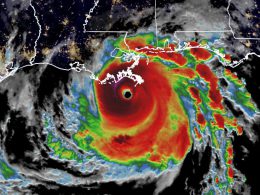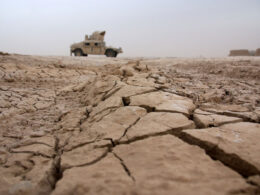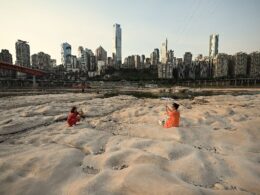Widespread flooding has led to the destruction of homes, isolation and illness. This flooding is a damning indictment of both the government’s attitude to the unharnessed property sprawl facilitated by local councils over the last decade.
The flooding has been particularly bad in the west. In Galway, the worst areas affected have been Ballinasloe, Gort and Claregalway. At one stage or another roads east to Dublin, south to Limerick and north to Cork have all been closed and rail and bus services were cancelled. Calls have been made for County Galway to be declared a disaster area as thousands of people were stranded across 1,300 miles of the county.
One Gort resident said: “We have huge areas marooned, villages marooned off, and people are isolated in their homes. We are in a sad situation and we do not know when it is going to finish or how far it will go.”
The floods have also affected drinking water in Galway, with slurry and other waste being washed into community water schemes. In Ballinasloe, the boil water notice has been extended by two months after detection of levels of cryptosporidium, the virus that infected 5,000 and seriously hospitalised 40 people in Galway in 2007. The HSE has also issued a health warning for occupants of flooded houses, who are at risk of flu and other viruses.
November 2009 has had more than double the normal rainfall for the month and 2009 as a whole is expected to be the wettest year since records began. According to Met Eireann: “Ireland has had three extraordinary years of rainfall, both in terms of the overall amounts of rain and in the number of very intense spells of heavy rain… such events have rarely occurred so close together in time or over so many locations so it is reasonable to wonder if this is a feature of a changed climate… the expected long term trend is towards a wetter west of Ireland and more frequent heavy falls generally.”
This is backed up by the Department of the Environment’s National Climate Change Strategy, which says: “Rainfall in June will decrease by about 10% compared to the present while December values show increases in the range of 10-25%.” Despite warnings, recent events have shown, the government has no strategy to fight the effects of climate change like flooding and drought.
One effect of the housing sprawl has been major reduction of soakage areas across the country. This has been continuously highlighted by county development plans, but hasn’t been acted upon. For example, North Tipperary County Council warned: “Unless carefully sited and designed, new development or redevelopment can increase run off from impermeable surfaces such as roof and paved areas, which can result in.. increased risk of flooding in areas downstream of the development”
Over the last decade, turloughs (seasonal lakes) and floodplains have been re-zoned for development without due consideration to the impact on natural soakage. A lack of such soakage means that in stormy conditions more water flows into rivers, the water level increases and rivers burst their banks.
Another reason for the overflowing of rivers is the complete lack of maintenance of rivers and other waterways for decades. Rivers should be regularly dredged to prevent the build-up of clay, silt and rubbish at the river bed. Dredging increases the capacity of rivers, thereby reducing the risk of flooding. However, this must be carried out in an environmentally friendly manner to conserve the species that thrive on river beds.
The planning chaos that has resulted in the lack of soakage and lack of river maintenance was facilitated at every step by the establishment parties in power on local councils and by FF/PD governments. Just as proper transport or educational infrastructure was not provided for these developments, neither was proper flood management infrastructure.
In a time when floods are expected to become worse and more frequent, the government should be investing in infrastructure such as large artificial lakes or underground storage tanks to store the large flows of water as a result of storms.
In 2008, the OPW only spent 82% of its flood relief budget and as a result the government intended cutting this flood relief budget. The reality is that the current government has no intention to invest properly in flood prevention or any other area of fighting climate change. As a result, not only are we the ones paying for their economic crisis, we’re also paying for their environmental crisis.
For now, the focus needs to be on assisting those affected by the flooding. Emergency rescues should be organised immediately for isolated villages like Clonfert in east Galway, where a team of 15 volunteers are trying to evacuate people. The state should use resources such as helicopters and boats to evacuate the village, and others like it, until the water has subsided.
In farms around Galway, the floods have also had a devastating effect. Flood waters have caused widespread damage to fodder (hay, silage etc.) used to feed animals. This is leading to hardship for already struggling small farmers and could pose animal welfare problems. The government’s response of distributing 40 loads of silage and 40 tonnes concentrated feed (valued at €2m) to farmers is completely inadequate.
The fact that this package is means-tested is holding up the distribution to no end. The government should immediately purchase surplus fodder from unaffected farms in the east and undertake a mass distribution of fodder to farms in the west and midlands.
At the same time, the government must provide the necessary flood relief and compensation for all victims of the floods. The current flood relief package at €10m is nothing short of a disgrace. To put the sum in context – in 2008, five top directors in AIB, BOI and Anglo got €11m in bonuses.
Mary Hanafin defended the relief package saying that “Unfortunately humanitarian assistance cannot be compensation, and we certainly don’t want the insurance companies to walk away from their responsibilities” However, most ordinary people will get nothing from the insurance companies due to the ‘Act of God’ clause. Families will have to foot the bill themselves while having to put up with damage that will take months to repair.
The government should undertake a series of public works to make sure that this level of flooding is never allowed to happen again. These works should include the construction of flood management infrastructure, a scheme to create or recover large soakage areas and a national programme of river dredging and maintenance of rivers and other waterways.
These works should be funded through the nationalisation of the banks and the freeing up of credit. They would make up part of a massive series of public works designed to create thousands of jobs through the construction and upgrading of infrastructure, with special attention to embracing renewable energy and fighting the effects of climate change.












